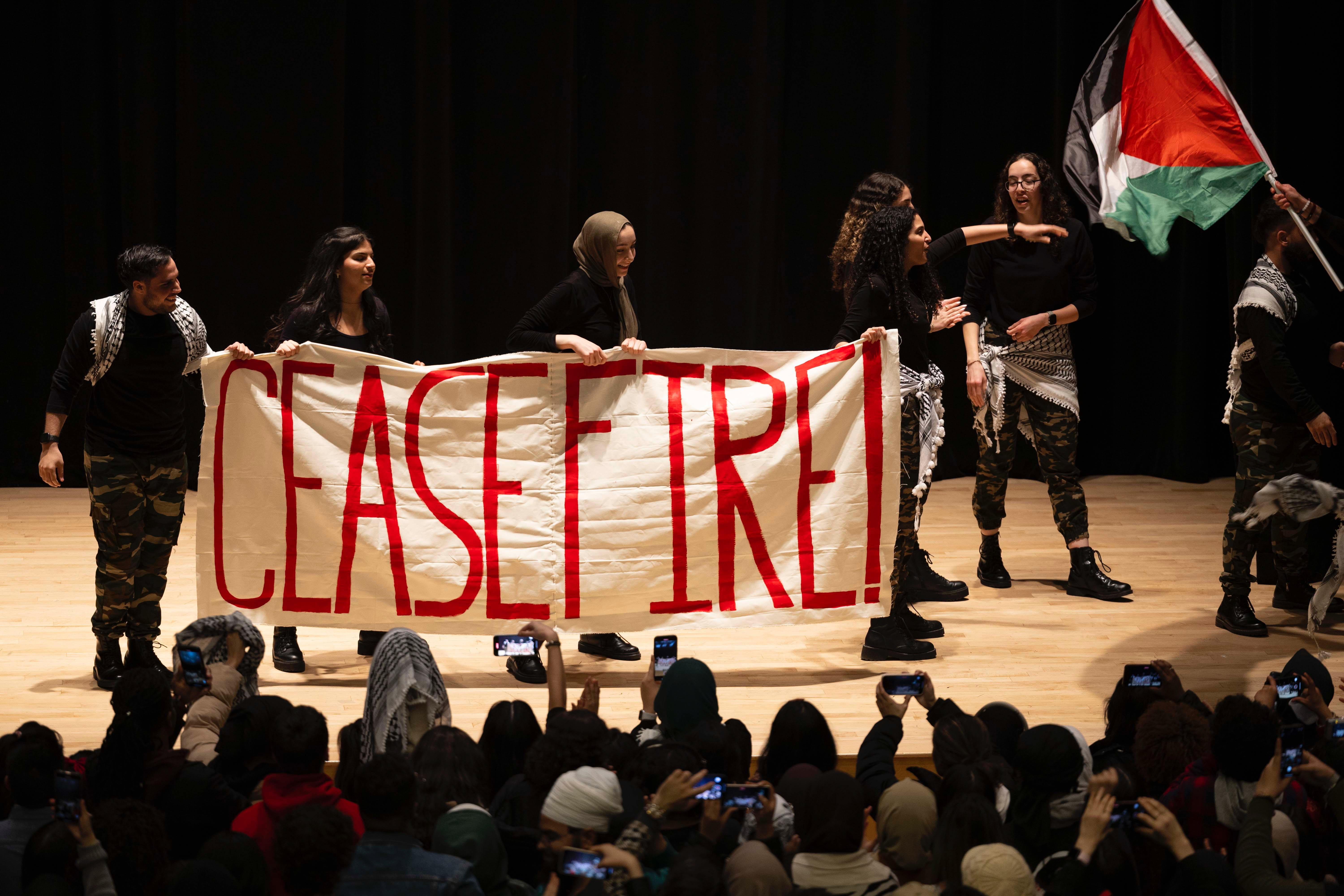
Ohio State organizations Students for Justice in Palestine and the Palestine Women’s Association held up a sign calling for a ceasefire of the Israel-Hamas war during a cultural dance at the “Taste of OSU” event on Feb. 16 at the Ohio Union. Credit: Maya Hamed
For more than 20 years, Ohio State has hosted the “Taste of OSU,” giving student organizations the chance to showcase their culture through food, performance and more.
At this year’s event, held Feb. 16 in the Ohio Union, Students for Justice in Palestine and the Palestinian Women’s Association sold the most tickets to the hundreds of attendees. The group also won the event’s other two categories, best food and best cultural booth.
In the midst of violence, the two groups wanted to highlight Palestinian culture, food, music and beauty, said Donia Al-kashkish, a third-year in neuroscience and secretary for the women’s association.
“With the current situation going on, we know that a lot of people see Palestine or hear Palestine and think of destruction, and we wanted to change that,” Al-kashkish said.
Over 1,400 food tickets were turned in at the booth, Maya Hamed, a third-year in landscape architecture and vice president of the women’s association, said. Hamed said the win surprised the group and it appreciated the opportunity to spread Palestinian voices.
In addition, the two organizations received $600 for their win, which they plan to donate to HEAL Palestine, a nonprofit that provides tents, food and aid to children in Gaza, said Heba Latif, a fourth-year in political science and leader in both organizations.
“It only feels right to donate it back since we were doing it for them,” Latif said.
The organizations served musakhan, or sumac chicken rolls, and baklava, which was Latif’s father’s recipe. The judges said the baklava and musakhan reminded them of home-cooked comfort food, which Latif said was one of her goals.
Reyann Askar, a third-year in health sciences and outreach chair for the women’s association, said it was heartwarming to see people enjoy the food and return for more, with many people requesting recipes following the event.
“People would come try something and then they’d come back and get like five or six more of the same item because they liked it so much,” she said.
Members also performed Dabke, a cultural dance that signifies unity and hope. Before leaving the stage, the group held up a banner urging for a ceasefire in the current war in Gaza.
“The performance was a big tribute to our people, especially at the end,” Askar said. “Every single thing we do is to help our people.”
Jineen Musa, a second-year in health information management systems and SJP outreach chair, said it always feels like Palestinians are alone, but as the troupe walked on stage and the event announced their win, there was an incredible amount of support.
“You could just see the love and the appreciation for Palestine,” she said.
This was special to the group as Askar said many people generalize the Middle East, and this allowed them to showcase Palestinian culture.
“I think a lot of people see the Middle East as just like, well, it’s the Middle East, there’s always stuff going on there, and it’s a war zone all the time,” Askar said. “But there’s still people there and we have such a rich, beautiful culture and I’m so glad that we got to showcase that.”
Latif said this display of Palestinian culture demonstrated their resilience in the face of the ongoing crisis.
The booth also included Palestinian history, dating back to 1948 and eight white display boxes with a bloodied white background. Each box included story of a Palestinian who had been killed during the Israel-Hamas war, along with a symbol connected to the person, such as a stuffed toy for an infant who died during the conflict.
“[Palestinians] don’t have a voice, and we’re kind of acting as a voice for them,” Latif said. “Our existence is politicized, and so we cannot be Palestinian without our political and cultural aspects,” she said.


